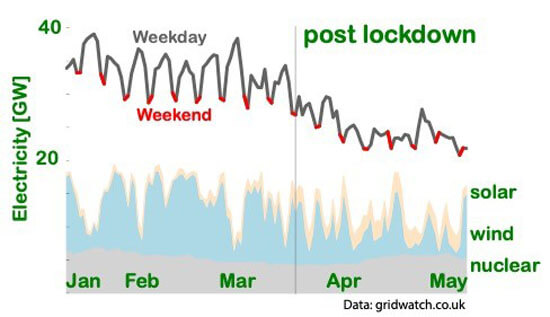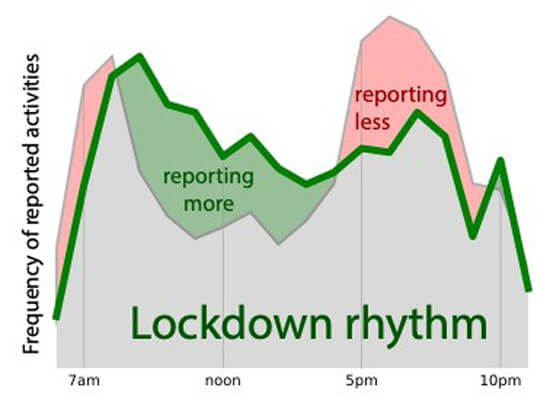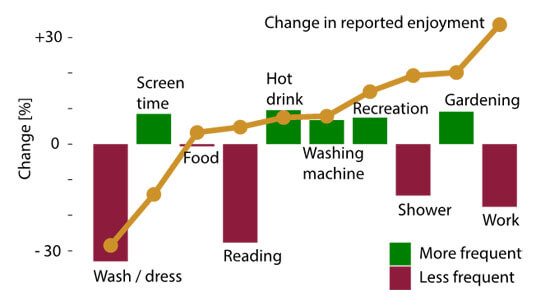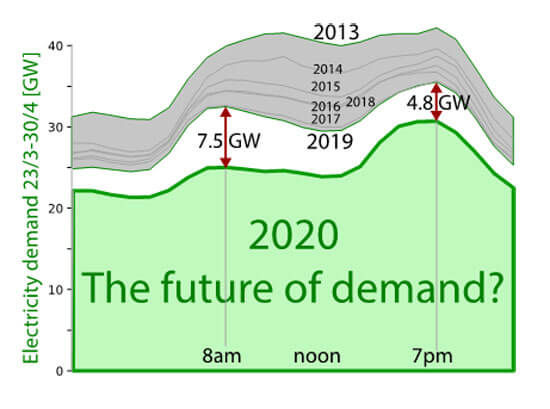
How has behaviour changed under the COVID-19 lockdown?
Dr Phil Grunewald from Oxford University has observed patterns in people’s behaviour and energy use for years. In this guest blog, he highlights some of the major changes in our lifestyles since the lockdown began.
Have we found a better way of life?
The lockdown has brought a sudden and unprecedented step-change in energy use. The established daily and weekly rhythm of our national electricity consumption experienced something akin to a cardiac arrest. Much of the weekly up and down is gone and the distinction between weekdays and weekends has become blurred.

Loss of rhythm. Demand is down, and weekly patterns are disrupted.
To understand what is going on, we’ve peeked behind the electricity meters to explore what people do differently. That is the mission of the Oxford METER project, which has collected activity records and high-resolution household electricity profiles for the past years using the JoyMeter.uk app.
When are people active under the COVID-19 lockdown?
The timing of when people report to have performed activities has shifted significantly since the lockdown started. On average the morning peak of activity is now one hour later at 9 am. If you don’t have to commute to work anymore, you can treat yourself to an extra hour in bed, and many will have stopped setting alarms at all. Anyone with teenagers at home will know that these numbers come with some diversity.

Shift in activity levels. Later starts, calmer evenings
Even more striking is the shift in the evening, when 5-7 pm is a period typically associated with the peak in national electricity demand. Here we see the most significant reductions in activity levels. What used to be the most intense period is now much calmer, and our data suggests that this also results in electricity demand reductions.
Why is that such a good thing? Quite simply because peak demand is most likely to require non-renewable backup or expensive storage. Reducing electricity consumption during this period is economically and environmentally valuable but was hitherto thought to be socially unacceptable. The lockdown shows that without the conventional working and commuting hours, some people may naturally be less (energy) active during these periods.
What do we do less under COVID-19 lockdown?
Looking at specific activity changes, we observe some expected and some less expected shifts. Transport has fallen off a cliff in our data, as people have stopped travelling for work and leisure. (Though perhaps the 83% reduction is in part due to social desirability bias – where people dare not record their remaining travel for fear of stigma. )

Changes in activity in the first 2 weeks of lockdown. Note – we started off doing lots more cooking, but seem to have got bored of that and reverted back towards the mean!
Other activities also see dramatic changes. Showers, washing and getting dressed are reported significantly less often. Clearly, we used to make more of an effort when facing work colleagues in person. This confirms that much of our laundering practices are social conventions, which may be changeable, with potentially beneficial effects on energy demand.
The reduction in reading frequency is something of a mystery. Naturally, the lure of screentime is very strong for those with more time on their hands. Nevertheless, the self-reported enjoyment figures suggest that those who pick up a book have a better time of it than those who are upping their Netflix hours.

Change in reporting frequency and enjoyment of the most common activities since lockdown began
What do we do more under COVID-19 lockdown?
The real winners are some of our old favourites: recreational activities, which include the new national convention of one exercise per day, and gardening. For those who have the opportunity, gardening has long been a source of well-being. During lockdown, this appears to be particularly the case.
The other well-established British coping mechanism is also present and correct. In difficult times, what could be better than a cup of tea? Hot drinks were already one of the most reported and enjoyed activities before the lockdown. Now we report them more often and enjoy them even more.
What should we do more of under lockdown?
So if work, travel, and washing are all reduced, with beneficial effects for the environment, what should we do instead? To enhance enjoyment while keeping your environmental impact low, consider the whole bottom right corner of the graph below.

Energy intensity and enjoyment of activities (size = frequency)
Among them are sleeping, socialising and reading. Sleeping we seem to be doing OK if the later starts are anything to go by. Socialising is obviously inhibited. Chances are that when the lockdown gets gradually relaxed, we will meet again with an appreciation like never before.
In the meantime, it seems advisable to pick up a good book.
How has electricity demand changed during lockdown?
The reduction we see in overall demand – dramatic as it is – is not as seismic if seen in the context of the past few years. Demand has fallen by similar amounts between 2013 and 2019. If we continued this trend, the load levels we see at the moment are merely a glimpse into the future.
This can help us to learn more about the integration of renewables as a significant share of generation and single out what the impact of more EV and electrified heating will be. EV may be less of a problem for the grid if we can sustain some of the newly found patterns of working from home. Heating, on the other hand, becomes even more critical. While we work from home, bills are likely to go up between 10% and 20% for many households. Those with efficient heating systems will be affected less.

Demand has fallen for years. Lockdown brought down morning ramp up and evening peaks.
Electricity bills should fall
Even though household demand is going up for many, it could be argued that bills should not. As we have seen above, the overall demand is down because of less activity in the industrial and commercial sectors. As a result, the share of lower-cost renewable electricity has increased. Households also contribute less to peak demand, so less expensive peak-time generation is required. Much like motor insurance companies have seen their costs fall, so have utility companies. They should, therefore, consider giving their customers a discount for the fall in fuel costs.
It’s not all about the money
How much were people paid to stay at home during the lockdown? Nothing. Millions of people changed their lives from one day to the next just because someone asked them to. That person clearly had some authority, backed with evidence and an appreciation that their request was serious.
This has far-reaching consequences for what we can do to reduce or change energy demand. Let’s consider the possibility that throwing money at people (or penalising them) is not the only option.
Let’s understand the rhythms of life and inform people about them in educated ways. There may be significant potential out there for energy use patterns that work better with a zero-carbon future.
Demand reduction and a lower carbon future is possible without putting people in lockdown.
Join in the study!
- You can be part of the Oxford METER project by downloading the JoyMeter.uk app and recording your household’s activities for a day. Registering with the app gives you the chance to win a full year’s free electricity.
- Dr Philipp Grunewald is an interdisciplinary researcher at the University of Oxford, where he leads the METER project on the understanding of household energy use and its flexibility. Contact philipp.grunewald@ouce.ox.ac.uk
Phil said reading is good, right?
- So do check out more articles like this on the Joju blog. And if you don’t want to miss any stories, why not sign up for one of our quarterly newsletters?



Sorry, the comment form is closed at this time.